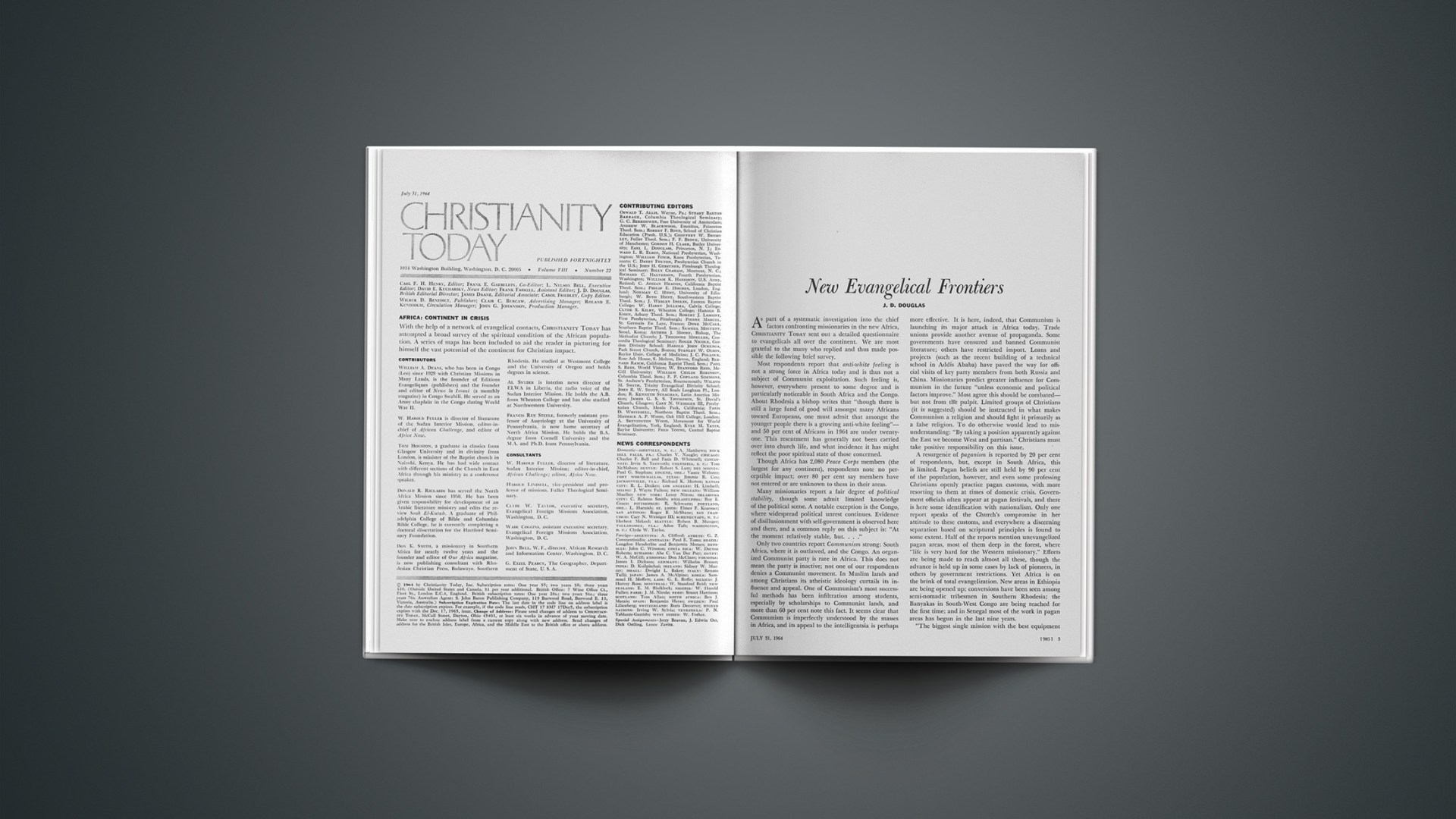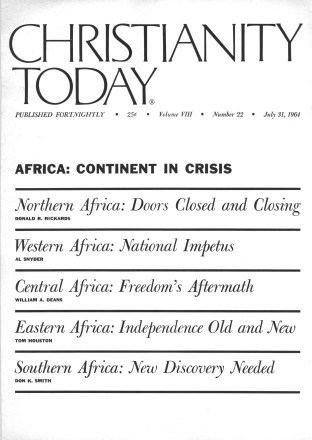As part of a systematic investigation into the chief factors confronting missionaries in the new Africa, CHRISTIANITY TODAY sent out a detailed questionnaire to evangelicals all over the continent. We are most grateful to the many who replied and thus made possible the following brief survey.
Most respondents report that anti-white feeling is not a strong force in Africa today and is thus not a subject of Communist exploitation. Such feeling is, however, everywhere present to some degree and is particularly noticeable in South Africa and the Congo. About Rhodesia a bishop writes that “though there is still a large fund of good will amongst many Africans toward Europeans, one must admit that amongst the younger people there is a growing anti-white feeling”—and 50 per cent of Africans in 1964 are under twenty-one. This resentment has generally not been carried over into church life, and what incidence it has might reflect the poor spiritual state of those concerned.
Though Africa has 2,080 Peace Corps members (the largest for any continent), respondents note no perceptible impact; over 80 per cent say members have not entered or are unknown to them in their areas.
Many missionaries report a fair degree of political stability, though some admit limited knowledge of the political scene. A notable exception is the Congo, where widespread political unrest continues. Evidence of disillusionment with self-government is observed here and there, and a common reply on this subject is: “At the moment relatively stable, but.…”
Only two countries report Communism strong: South Africa, where it is outlawed, and the Congo. An organized Communist party is rare in Africa. This does not mean the party is inactive; not one of our respondents denies a Communist movement. In Muslim lands and among Christians its atheistic ideology curtails its influence and appeal. One of Communism’s most successful methods has been infiltration among students, especially by scholarships to Communist lands, and more than 60 per cent note this fact. It seems clear that Communism is imperfectly understood by the masses in Africa, and its appeal to the intelligentsia is perhaps more effective. It is here, indeed, that Communism is launching its major attack in Africa today. Trade unions provide another avenue of propaganda. Some governments have censured and banned Communist literature; others have restricted import. Loans and projects (such as the recent building of a technical school in Addis Ababa) have paved the way for official visits of key party members from both Russia and China. Missionaries predict greater influence for Communism in the future “unless economic and political factors improve.” Most agree this should be combated—but not from the pulpit. Limited groups of Christians (it is suggested) should be instructed in what makes Communism a religion and should fight it primarily as a false religion. To do otherwise would lead to misunderstanding: “By taking a position apparently against the East we become West and partisan.” Christians must take positive responsibility on this issue.
A resurgence of paganism is reported by 20 per cent of respondents, but, except in South Africa, this is limited. Pagan beliefs are still held by 90 per cent of the population, however, and even some professing Christians openly practice pagan customs, with more resorting to them at times of domestic crisis. Government officials often appear at pagan festivals, and there is here some identification with nationalism. Only one report speaks of the Church’s compromise in her attitude to these customs, and everywhere a discerning separation based on scriptural principles is found to some extent. Half of the reports mention unevangelized pagan areas, most of them deep in the forest, where “life is very hard for the Western missionary.” Efforts are being made to reach almost all these, though the advance is held up in some cases by lack of pioneers, in others by government restrictions. Yet Africa is on the brink of total evangelization. New areas in Ethiopia are being opened up; conversions have been seen among semi-nomadic tribesmen in Southern Rhodesia; the Banyakas in South-West Congo are being reached for the first time; and in Senegal most of the work in pagan areas has begun in the last nine years.
“The biggest single mission with the best equipment and the largest number of workers.” This report from Malagasy concerning the Roman Catholic Church is applicable also to several other countries in Africa. In some places (Ivory Coast, for example) it holds equal power with Islam, and its impact is felt in nearly all the countries. A more cooperative spirit toward Protestants is noted by 50 per cent of respondents, half of whom describe relations as “friendly.” Only in Senegal and Ivory Coast does the Roman church openly oppose and persecute evangelicals. This is aimed chiefly at converts from her own fold, with special strictures placed on reading the Bible. Signs of a renewal within Catholicism are visible among laity and youth in Togoland, where there has been a “shift toward more biblical thought, though this has not yet found momentum as it has in Europe.” A similar renewal is mentioned from 30 per cent of other countries. Roman Catholicism has been concentrating increasingly on education, an avenue now cut off in some countries through nationalization of schools, as in the Central African Republic and Sierra Leone. Fifty per cent do not believe that Romanism in Africa is an obstacle to the preaching of the Gospel or a threat to Protestant growth. Others argue that its combination of heathen practices and religion (its influence is increasing in fetish areas) and the involvement in politics that brings all Christians under suspicion, are grave stumbling blocks. Church leaders and churches favoring reunion with Rome are reported by 37 per cent of respondents. In Malagasy there are joint study groups and a joint Bible translation committee. The French Reform churches of North Africa, and Anglicans, Methodists, and Congregationalists in West Africa, are all vocal on reunion, but there is evident in some quarters a marked ignorance about the full implications of this. To others the very mention of the Roman Catholic Church is still anathema.
Besides the state churches of Ethiopia (Coptic) and South Africa (Dutch Reformed), six countries have an actual or virtual Roman Catholic state church. Elsewhere, and unofficially, Anglicans, especially in East Africa, might be considered in that category, while in other areas Methodists exercise the greatest influence. In the case of state churches the attitude to minority groups is often described as unhelpful.
More than 50 per cent mention the Scriptures when asked what factors have contributed to evangelical church growth, with special emphasis on Bible schools and vernacular translations. Several spoke of revival as a further factor here. According to 25 per cent, the new political consciousness reverses rather than accelerates church growth. Also cited as barriers are the moral qualities expected of Christians (especially in family life), Islam, illiteracy, and sheer indifference.
Assessment of missionary impact on the continent in the past varies greatly from a curt “negligible” (Morocco) to “the Gospel has brought to all classes liberation from fear” (Malagasy). The fact that pagan areas have been most responsive is inseparable from the common African phenomenon that “most strength is rural.” Cities and urban districts have proved difficult to penetrate and are in some degree neglected. The weakest impact has been among the educated; even those once influenced by Christianity are tending to fall away. Another point here concerns the Church’s general lack of concern for social problems that are breaking Africa’s back. Even in places where there is awareness and concern (as in the Congo) little has been done.
Evangelistic techniques have been largely traditional. Personal visitation is most often cited as successful. Open-air preaching, literature distribution, and tent work are mentioned also. Three countries report that Christian films have been used with profit: in North Africa this has proved one of the best methods. Southern Rhodesia has found a significant approach through agricultural development. Most of the 60 per cent who express the view that their churches have a concern for soul-winning say also that this is usually limited to their own sphere and that there is very little true missionary vision.
National leadership of the Church was rated by the C.A.R. respondent as “lacking in training, insufficient in numbers, and unpredictable in stability,” features found also in other African churches. Pastors are often less well trained than secular workers and so are “blind to problems of strategy, planning, and finance.” Some are advanced in years, and change comes hard. Practically all respondents expressed the need for evangelical unity. The best example of this is probably the Christian Council of Kenya; others exist in Upper Volta and Cameroon. In Nigeria, merger talks are proceeding among Anglicans, Congregationalists, and Methodists. Twenty per cent of respondents said that their areas already had sufficient unity; but in three countries evangelical fellowships are of recent origin, and efforts toward the same end are being made in South Africa and Tanganyika. Nearly all respondents report national church leaders strongest in preaching and witnessing but point out the versatility demanded by the varied tasks of an African pastor. Though all but two respondents felt the leadership training was inadequate, lack of candidates has held up the program in such places as Nigeria and the Congo. Other reasons cited for delay include lack of funds, of qualified men, and of appropriate books in the vernacular. Shortage of candidates in booming Africa is blamed on materialism—“educated youth think in terms of fine salaries,” reports the Upper Volta representative. Nigeria names four national theologians, and Morocco lists three well-known Christian doctors; but 75 per cent of respondents report no national theologians or scholars.
No fewer than seventeen countries stated that Islam is gaining ground, a fact particularly apparent in West Africa. Ten lands report Koranic schools as a means of propagation. In some areas, such as Sudan and Somalia, these are government-sponsored, and Islam is a compulsory subject in all schools. Infiltration into village life, especially through traders, is also common. For further details of Islam in Africa see the separate essay by Dr. Francis Steele (page 19).










